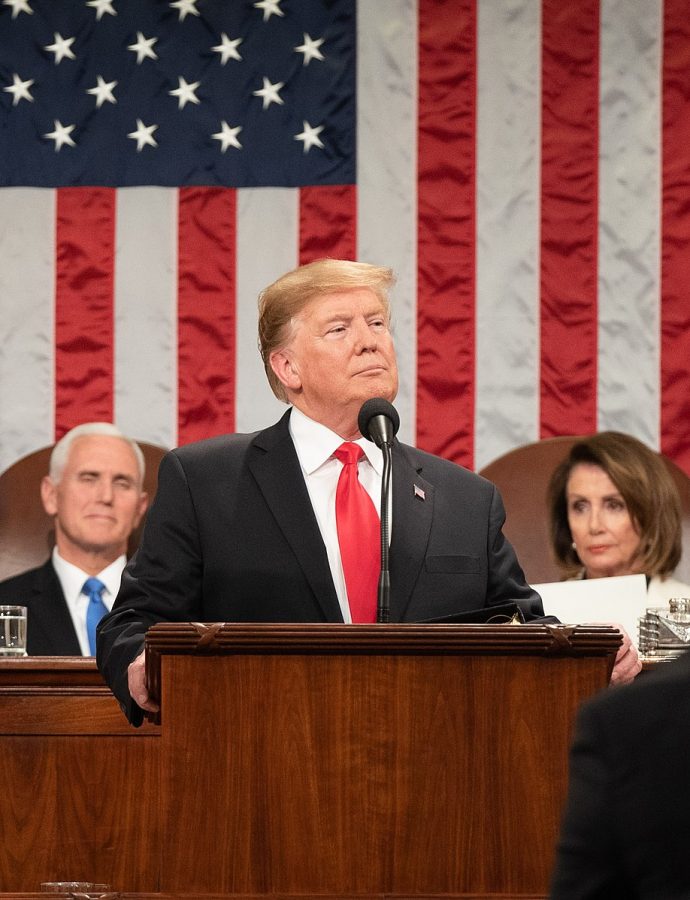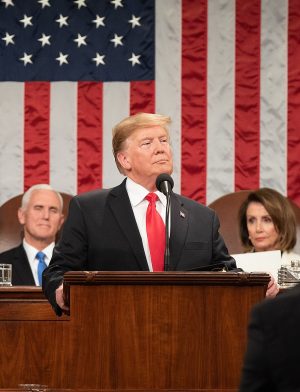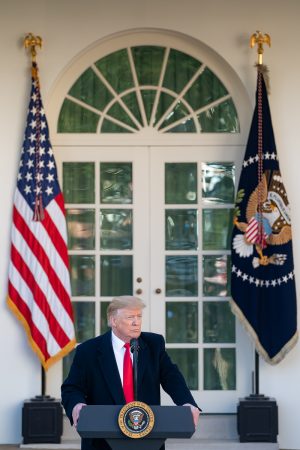Trump Agrees on New Spending Bill; Promises an Emergency Declaration
New funding legislation is poised to evade a second shutdown while Trump contemplates exercising his executive powers
President Donald Trump delivers the State of the Union address at the U.S. Capitol on Feb. 5, 2019. (White House/Shaelah Craighead)
January 23, 2019
After racing to pass a spending bill to avert a second government shutdown, President Trump has agreed to sign a new federal budget into effect on Thursday following weeks of tumultuous border security talks. The bill — which was passed by the Republican-led Senate 83-16 — proposed $1.375 billion for border wall funding, significantly less than the $5.6 billion that Trump had rallied for. The funds would only cover a quarter of the 200-plus miles of the Mexican border outlined in the president’s original proposal. The legislation is expected to pass the Democratic-led House and is to be signed by the president.
However, Trump has suggested that he is willing to exercise his executive powers to obtain money for the wall. White House spokeswoman Sarah Sanders said that Trump “will also take other executive action — including a national emergency,” the Associated Press reported. However, declaring a national emergency would almost certainly be met with opposition by Congressional Democrats and some Republicans.
House Speaker Nancy Pelosi, D-Calif., and Senate Minority Leader Chuck Schumer, D-N.Y., said that an emergency declaration by the president would be a “gross abuse of the power of the presidency,” in a joint statement. Many lawmakers feel that such a declaration would infringe upon the powers of Congress to allocate taxpayer funds for various federal expenditures. “Declaring a national emergency for this purpose would be a mistake on the part of the president,” said Sen. Susan Collins, R-Maine, in a statement.
Despite the criticisms from members of Congress, Trump has been touting the idea of a national emergency as a means of building the wall. Lawmakers that are considering fighting the declaration, however, must wait for any definitive actions to be taken. Trump’s insistence on following his key campaign promise comes after a historic 35-day partial government shutdown in which the president and GOP were seen as responsible for the shutdown in a Washington Post/ABC News poll. The poll asserts that 53 percent of Americans blame Trump and Republicans for the shutdown; 29 percent say that the Democrats are to blame.
This post was last updated 02/15/19. This post will continue to be updated as the story develops.
Trump Signs Temporary Spending Bill to Reopen Government
Published: 01/28/19
On Jan. 25, President Donald Trump signed a bill to reopen shuttered federal agencies, ending the longest government shutdown in U.S. history. Trump made several concessions by signing the bill, namely that the government was reopened before reaching a deal including the border wall. The agreement provides funding to the nine closed federal departments until Feb. 15; the bill does not include any funding for the border wall.
The Senate and the House unanimously approved the bill, and it was signed into effect late Friday. Trump’s move to sign the bill came after reports of widespread delays at airports as hundreds of TSA agents failed to report to work and as federal employees were poised to miss a second pay period.
“This was in no way a concession,” Trump wrote on Twitter late Friday. “It was taking care of millions of people who were getting badly hurt by the Shutdown with the understanding that in 21 days if no deal is done, it’s off to the races!”
Furloughed workers will be able to return to work; Friday’s deal contains back pay for the 800,000 employees who were without pay. A committee of bipartisan lawmakers has been formed to develop a legislative spending plan. Senate Majority Leader Mitch McConnell hopes that leaders will be able to have “good-faith negotiations over the next three weeks to try to resolve our differences.”
However, Trump said that the shutdown would resume on Feb. 15, if no deal was made. He has also suggested that he is able to declare a national emergency to bypass Congress and fund the wall; however, that move would almost certainly be challenged in court. Trump continues to fervently support the border wall, writing on Twitter, “Build a wall and crime will fall.”
While wall funding is not likely to gain any Democratic support, other border security measures, such as fortifying infrastructure and immigration court reforms, remain on the table.
This post was last updated 01/28/19. This post will continue to be updated as the story develops.
Senate Declines Plans to End Shutdown
Published: 01/25/19
Thursday’s Senate vote concluded with no concrete plan as both the Democratic and Republican bills to end the shutdown were rejected, leaving the government in continuing state of unrest. On Friday, 800,000 federal employees will miss their second paycheck; 460,000 federal employees are working without pay.
Congress Set to Vote on New Shutdown Legislation
Published: 01/23/19
The partial government shutdown that began on Dec. 22, 2018, has endured to its fifth week, making it the longest government shutdown in U.S. history. In December, President Trump and congressional Democrats failed to negotiate a legislative spending bill before Congress adjourned. The shutdown has left 800,000 federal employees furloughed or working without pay, according to The New York Times. The situation remains dire for the 450,000 federal employees who must work without pay.
On Thursday, the Senate is set to vote on two drastically different bills in an attempt to reopen the government. The first vote is for the bill, championed by Senate Majority Leader Mitch McConnell, R-Ky., offers temporary protections for “Dreamer” immigrants in exchange for $5.7 billion in border wall funding. In addition, the legislation offers $12.7 billion in disaster aid, as well as an extension for the Violence Against Women Act that expired as last year’s government funding became void. Other measures include changes to asylum law that would make seeking refuge more difficult for people fleeing violence and prosecution.
However, the Republican-backed bill was admonished by Democrats including Senate Democratic Minority Leader Chuck Schumer, D-N.Y., who said, “The president’s proposal is just wrapping paper on the same partisan package and hostage-taking tactics.” The bill is expected to fall short of the 60 votes needed to pass, the Associated Press reported.
Additionally, the Senate is set to vote on a bill that was passed by the Democrat-controlled House. The bill outlines a plan to reopen the government until Feb. 8, while negotiations continue. Additionally, the bill allocates $1 billion for border security, including funding for 75 additional immigration judges and infrastructure upkeep—the bill does not include any funding for the southern border wall. However, the bill would require the support of 13 Senate Republicans, making it unlikely to pass. Additionally, McConnell has continued to refuse any proposal that does not have the president’s support.
Meanwhile, federal courts are set to run out of funds by Feb. 1, according to the administrative agency for the judiciary. Staffers who have “critical” positions are expected to work without pay. The partial government shutdown is due to surpass a second pay period, leaving employees’ livelihoods hanging in the balance of a political stalemate.
Partial government shutdown remains at an impasse into its third week
Published: Jan. 18, 2019
The partial government shutdown that began on Dec. 22, 2018, has made headway into its third week after President Trump and congressional Democrats failed to negotiate a legislative spending bill before Congress adjourned. The shutdown has closed nine of 15 federal departments including Treasury, State, Justice, and Homeland Security, leaving 800,000 federal employees furloughed or working without pay, according to The New York Times.
Trump maintained his hardline stance for border wall funding by declining to approve the Senate’s stopgap bill that would have funded the government through Feb. 8—where a new Congress would have deliberated the budget. On Jan. 5, the president said on Twitter that Democrats could end the shutdown in a “very short period of time” if they concede on the border wall, attempting to adhere to a key campaign promise. Congressional Democrats have offered $1.6 billion for border security excluding the wall, but Trump has continued to push for the $5.6 billion allotted by a spending bill from last year’s Congress; it was ultimately not passed by the Senate.
In a negotiation on Jan. 5, Trump administration officials, including Vice President Mike Pence and Homeland Security Secretary Kirstjen Nielson, pushed for $5.6 billion dollars in border wall funding, Politico reported. Following the meeting with congressional aides to House Speaker Nancy Pelosi (D-CA) and Senate Democratic Minority Leader Chuck Schumer (D-NY), Trump said on Twitter that “not much headway” was made during the meeting.
Following the Jan. 5 meeting, Trump told reporters in the Rose Garden that he may “call a national emergency and build [the wall] very quickly,” but continue negotiations for the time being, the Associated Press reported. Trump has maintained that he is willing to allow the shutdown to continue for “months or even years”.
“It’s very hard to see how progress will be made unless they open up the government,” Schumer said to NBC’s “Meet the Press.” Democrats have urged the president to reopen the government as negotiations continue, in order to provide stability to closed agencies including the U.S. Park Service, Transportation Security Administration (TSA), and immigration courts, according to CNN.
As Pence continued his talks with congressional leaders on Sunday, Trump began redefining the wall suggesting that it can be built with steel rather than concrete saying, “[Democrats] don’t like concrete, so we’ll give them steel.”
Meanwhile, several Republican Senators have called for border security talks to continue after the government reopens including Senator Susan Collins (R-ME). Collins said to NBC that the steel versus concrete discourse was “bizarre.”
“It is not a sign of weakness to try to figure out a middle ground, and I think that both sides need to indicate a willingness to listen and to compromise,” Collins said.
Despite the current impasse, Pelosi hopes to reopen agencies in the coming days by passing individual bills that could spur action by Republican lawmakers in the Senate who have expressed concern over the prolonged shutdown.
Democratic and Republican leaders have cited the floundering U.S. Park Service and TSA as a cause for concern. Due to understaffing, public safety is at risk in the park system. The lack of waste management and resources have possibly helped contribute to the three deaths that have occurred since the shutdown began. Additionally, TSA agents have called in sick in record numbers — slowing down airport operations — because they are working without pay.
If the shutdown continues through Tuesday, “then payroll will not go out as originally planned on Friday night,” said Mick Mulvaney, the acting chief of staff.


























![The Phoenix varsity volleyball team lines up for the national anthem. “We were more communicative [with each other] during this game, and I feel like we kept our energy up, especially after the first set,” senior Jessica Valdov said.](https://theblazerrhs.com/wp-content/uploads/2024/10/DSC_0202-1200x800.jpg)










![Junior Alex Alkhal pitches the ball. “[I] just let it go and keep practicing so we can focus on our goal for the next game to get better as a team,” Alkhal said.](https://theblazerrhs.com/wp-content/uploads/2025/05/DSC_0013-1-1200x929.jpg)


























